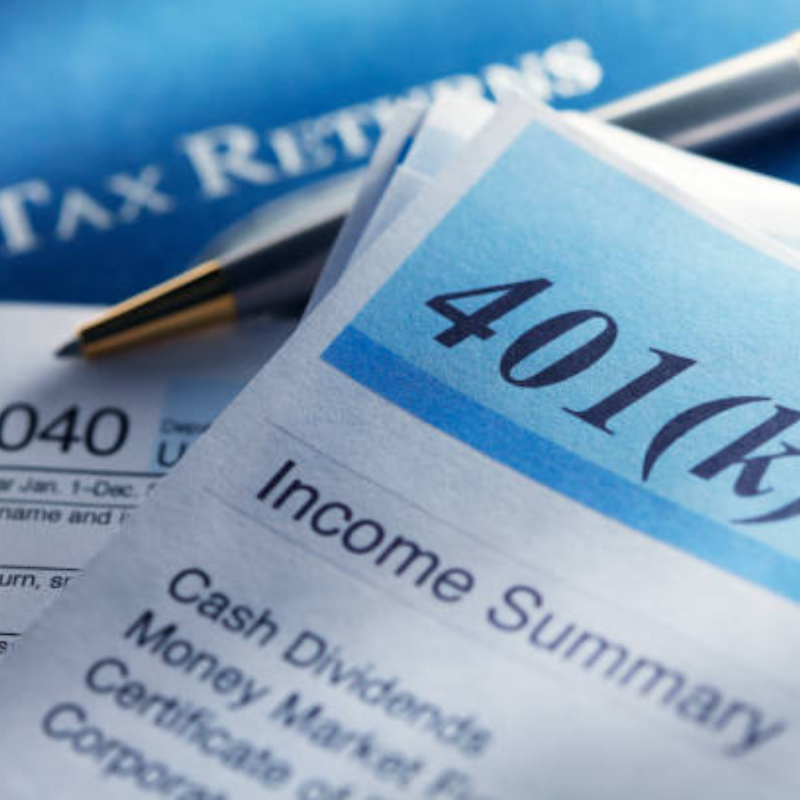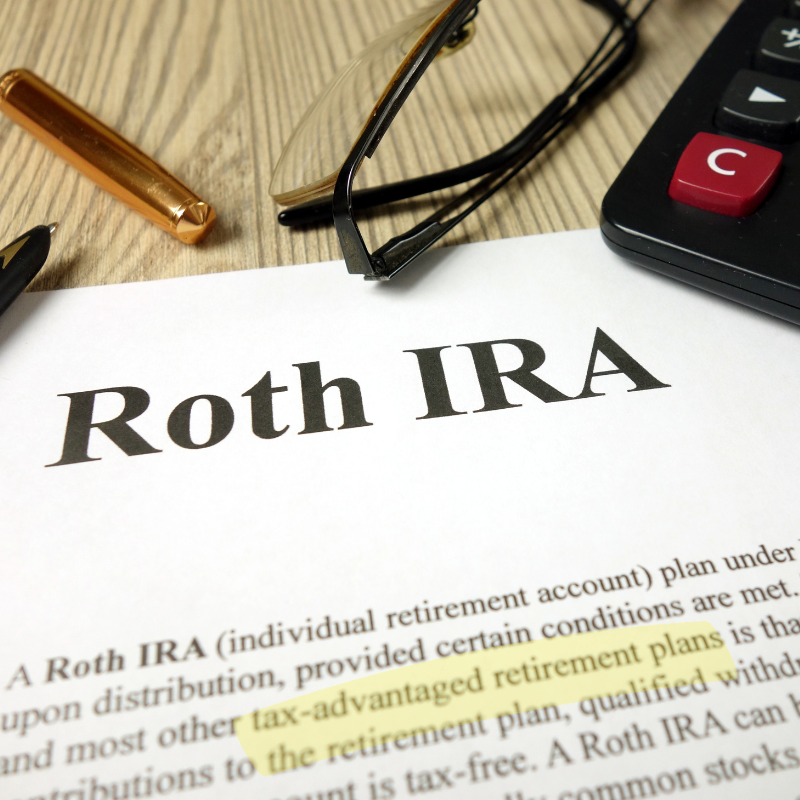Saving for retirement is one of the most important financial decisions we can make. Two popular retirement savings vehicles are the Roth account and the 401(k). But what exactly is the difference between these two options?
In this post, we’ll compare Roth accounts and 401(k)s to help you determine which retirement savings account may be better suited for your needs.
What is a Roth Account?

A Roth account is a type of individual retirement account (IRA) that allows you to contribute after-tax dollars and take tax-free withdrawals in retirement, with no required minimum distributions while the account owner is alive. This allows your money to continue growing tax-free.
Withdrawals of contributions and earnings are tax-free in retirement if certain criteria are met.
The main benefits of a Roth account are tax-free growth and tax-free withdrawals in retirement. This makes it an attractive option for retirement savers in lower tax brackets now who expect to be in higher brackets later.
What is a 401(k)?

A 401(k) is an employer-sponsored retirement savings account. Contributions are made with pre-tax dollars, lowering your taxable income now. Employer matching is allowed for up to 6% of the employee’s salary.
With this investment strategy, withdrawals are taxed as ordinary income in retirement and required minimum distributions begin at age 73.
The main benefits of a 401(k) are the high contribution limits, tax-deferred growth, and potential employer match. The tax deduction up front also provides immediate savings. Also, a 401(k) is best suited for those looking to maximize current retirement contributions.
Comparing a Roth Account and a 401(k)
Now that we’ve outlined the key features, let’s compare Roth and 401(k) accounts:
Tax Treatment in Roth Account vs 401(k)
The biggest difference between these two is their tax treatment. With a Roth account, you contribute after-tax dollars but withdrawals are tax-free. With a 401(k), it’s the opposite – you contribute pre-tax but you will pay taxes on withdrawals.
Which is better depends on whether you expect to be in a higher or lower tax bracket in retirement. If your tax rate is lower in retirement, the 401(k) may provide more savings. If it’s higher, the Roth account may be more beneficial.
Contribution Limits: Roth Account vs 401(k)
The contribution limits are quite different between Roth accounts and 401(k)s:
- For Roth IRAs in 2023, you can contribute up to $6,500 annually if you’re under age 50. Over 50, you can contribute an extra $1,000 as a “catch-up” contribution.
- For 401(k)s in 2023, you can contribute up to $22,500 annually. If you’re over 50, you can contribute an extra $7,500.
- There are income limits to contribute to a Roth IRA. In 2023, eligibility phases out between $153,000 (single filer) and $228,000 for couples filing jointly. There are no income limits for contributing to a 401(k).
Also, 401(k)s allow you to sock away significantly more for retirement each year. However, Roth IRAs are restricted by income. Many savers contribute to both accounts to maximize their retirement funds.
Withdrawal Rules: Roth Account vs 401(k)
The withdrawal rules also differ between the two accounts:
- Withdrawals from Roth accounts are tax-free in retirement (remember these are already post-tax dollars) and you can also withdraw tax-free earnings as long as you are at least 59 1⁄2 and have held the account for 5+ years.
- 401(k) withdrawals are taxed as ordinary income. If taken before age 59 1⁄2, you’ll pay a 10% penalty unless an exception applies.
- 401(k)s have Required Minimum Distributions starting at age 73. There are no RMDs for Roth IRA accounts.
So, Roth accounts offer more flexibility for tax-free withdrawals. But 401(k)s have stricter withdrawal rules and mandates. This gives Roth accounts an advantage for accessing funds early in retirement.
Employer Match: Roth Account vs 401(k)
A key difference is that 401(k)s offer employer matching contributions, while Roth accounts do not:
- Many employers match a percentage of your 401(k) contributions – usually between 3-6%. This is free money.
- Employers cannot match Roth contributions.
- Even if your employer offers to match contributions in a Roth 401(k), the match is still deposited to your traditional 401(k), and it will be taxable income later.
The employer match is a major benefit of the 401(k) and you’ll want to contribute enough to get the full employer match.
Choosing Between a Roth Account and a 401(k)

So how do you choose between contributing to a Roth account versus a traditional 401(k)? Here are some key factors to consider:
- Your current and expected tax bracket – If you think you’ll be in a higher bracket in retirement, Roth accounts can minimize taxes on withdrawals. If your bracket will be lower, a 401(k) will provide more upfront savings.
- Need for tax diversification – Having money in both pre- and post-tax accounts gives you more flexibility in retirement. You can minimize taxes on withdrawals.
- Access to retirement funds – With a Roth account, you can withdraw contributions anytime. Usually, 401(k) rules are more restrictive.
- Employer match – The employer match is a valuable benefit, amplifying your retirement savings.
As you near retirement, shifting some 401(k) funds to a Roth IRA via conversions often makes sense. Consulting a financial advisor can help optimize this strategy.
Case Scenarios: When to Choose a Roth Account Over a 401(k)

Here are some examples of when a Roth account may be preferable over a 401(k):
- You’re an early career worker with a lower income now but high earning potential later, so paying tax now at a lower rate makes sense.
- You want to retire early, before age 59 1⁄2. Roth accounts let you access earnings before this age restriction.
- You have income over the Roth IRA phase-out limits. A 401(k) has no income limits.
- You want to leave tax-free money to heirs. Roth beneficiaries inherit the account tax-free.
- You value tax diversification in retirement. Having Roth funds provides flexibility in managing taxes.
Case Scenarios: When to Choose a 401(k) Over a Roth Account

Here are some situations where a 401(k) may be better than a Roth account:
- You expect your tax rate to be lower in retirement than your current rate. A 401(k) provides more tax savings now.
- You highly value the 401(k) employer match. Make sure you contribute enough to get the full free amount.
- You want to lower your taxable income. The 401(k) contributions reduce your current adjusted gross income.
- You are not eligible for a Roth IRA due to income limits and your employer does not offer a Roth 401(k).
- You are age 50+ and want to make catch-up contributions above the Roth IRA limit. A 401(k) allows for much higher contributions.
Getting Professional Financial Advice in San Antonio, TX
About Larry Abraham: Helping You Choose Between a Roth Account and a 401(k)

Larry Abraham, a seasoned financial advisor from San Antonio, TX, brings over 40 years of expertise in insurance and financial services to assist you with pivotal decisions, such as choosing between a Roth account and a 401(k).
Dedicated to client education and long-term financial success, Larry offers personalized advice considering your unique financial situation, including current and future tax implications, income limits, employer contributions, early withdrawal requirements, and your financial goals. His services extend across life insurance, annuities, and disability insurance, ensuring a comprehensive approach to your financial planning needs.
To learn more about working with Larry Abraham for retirement planning and other financial needs, visit his website or schedule a consultation through his Calendly link. He serves clients across Texas, including San Antonio, New Braunfels, Austin, Dallas, Fort Worth, and Houston.
Frequently Asked Questions
Can I have both a Roth Account and a 401(k)?
Yes, you can contribute to both a Roth account and a 401(k) if you meet the eligibility requirements. Many retirement savers take advantage of both accounts to diversify their tax treatment and maximize retirement contributions. It’s wise to contribute at least enough to your 401(k) to get any available matching funds from your employer.
What happens to my 401(k) or Roth Account when I retire?
You have a few options when you retire:
- Leave the money in the account to continue growing tax-deferred or tax-free
- Begin taking withdrawals while following the rules for your age
- Roll the funds over to an IRA for more investment flexibility
- Take periodic withdrawals using a strategy like the 4% rule
- Purchase an annuity to convert funds to guaranteed lifetime income
Consult a financial advisor like Larry Abraham as you near retirement to determine the best strategy for your needs and goals.
How can I convert my 401(k) to a Roth Account?
If permitted by your plan, you can convert all or part of your traditional 401(k) balance to a Roth 401(k) account. You’ll owe income taxes on the amount converted. Alternatively, when you leave an employer, you can roll over your 401(k) to a Roth IRA in a process known as a Roth conversion. Taxes are due but future growth is tax-free. Conversions make the most sense when you expect to be in a higher tax bracket in retirement.
